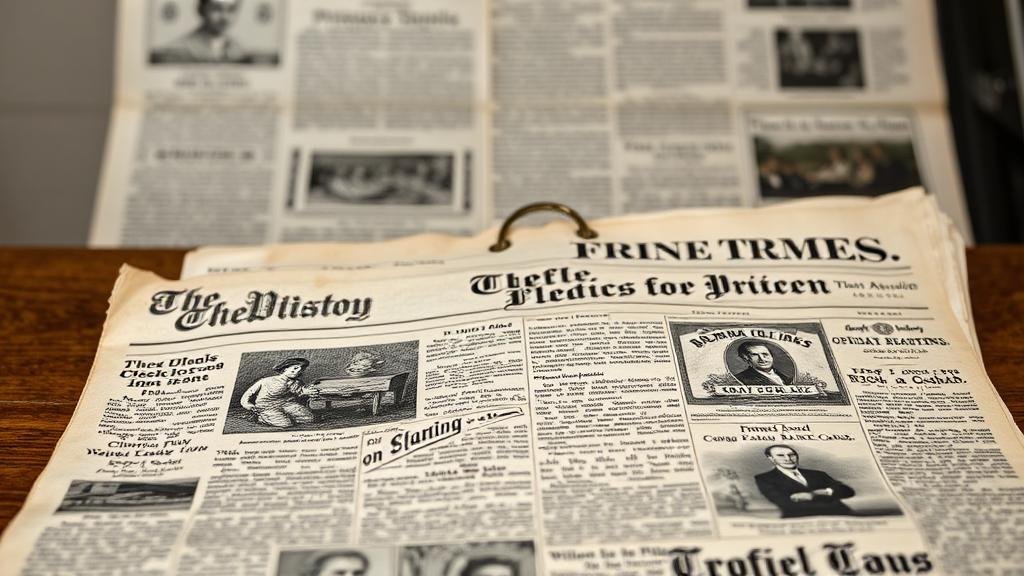Unveiling Hidden Relics with Chronicling America’s Newspaper Archives
Unveiling Hidden Relics with Chronicling America’s Newspaper Archives
The preservation and study of historical artifacts are vital in understanding the multifaceted narrative of the past. Among the wealth of resources available, Chronicling America, a project of the Library of Congress, serves as a pivotal repository of American newspapers dating from 1789 to 1963. This article explores how Chronicling America can unveil hidden relics from history, providing a lens through which researchers can study various aspects of American life, culture, and politics during different periods.
The Importance of Newspaper Archives
Newspaper archives are crucial in historical research as they offer primary source documentation that provides insight into public sentiment, social issues, and political climate over time. Chronicling America houses over 17 million digitized newspaper pages, making it an indispensable resource for historians, genealogists, and the general public interested in American heritage. For example, the documentation of the womens suffrage movement in the early 20th century is accessible through these archives, showcasing the evolution of public opinion on womens rights.
Case Studies: Discovering Historical Gems
Several case studies highlight the capabilities of Chronicling America in uncovering previously overlooked historical specifics. For example, an article dated June 28, 1919, from the Pittsburgh Gazette Times, provided firsthand accounts of local celebrations following the ratification of the 19th Amendment, signifying womens voting rights. This article not only documented the event itself but also revealed the sentiments of Pittsburgh residents at the time.
- The significance of local celebrations can often be overlooked; however, they reflect the zeitgeist of the era, providing invaluable cultural context.
- Another notable discovery is related to the Great Depressions impact on communities, as seen in various reports from the New York Times from 1930 to 1939, detailing unemployment statistics and grassroots relief initiatives.
Methodologies for Utilizing Chronicling America
Researchers looking to maximize their use of Chronicling America can apply specific methodologies to enhance their findings. Utilizing advanced search features allows for targeted exploration of terms and events, thus making it easier to uncover themes across multiple states and regions. For example:
- The use of keywords, such as Prohibition or Civil Rights, can yield comprehensive articles spanning different time periods and locations.
- Employing date filters helps to narrow searches to specific events, such as the stock market crash of 1929, thereby generating relevant results for deeper analysis.
Contributions to Historical Narratives
The use of newspaper archives like Chronicling America contributes significantly to the creation of a more nuanced historical narrative. By providing diverse perspectives from across the nation, historians can compile a more comprehensive account of events. For example, documenting the Civil War through local newspapers allows historians to compare official narratives with community-level communications, thereby enriching our understanding of the conflicts societal impacts.
Accessibility of Information
One of the advantages of Chronicling America is its accessibility to the public. Users can access the database without cost, making historical documents readily available for classroom education, scholarly research, or personal interest exploration. resource enhances the democratic access to historical information, allowing a broader audience to engage with their history.
Conclusion
To wrap up, Chronicling America’s newspaper archives are instrumental in unveiling hidden relics of American history. By providing access to primary source materials, researchers and the public can explore the intricate tapestry of past events, societal shifts, and cultural milestones. The archives empower users to engage deeply with history, prompting further research and a broader understanding of the American experience. Researchers are encouraged to leverage these resources to uncover hidden narratives, ultimately contributing to the rich understanding of historical developments.
Actionable Takeaways
- Use Chronicling America to engage with primary source materials for your research or personal interests.
- Incorporate specific date and keyword searches to unearth relevant historical narratives.
- Explore local newspaper articles to gain insights into regional perspectives on national events.



